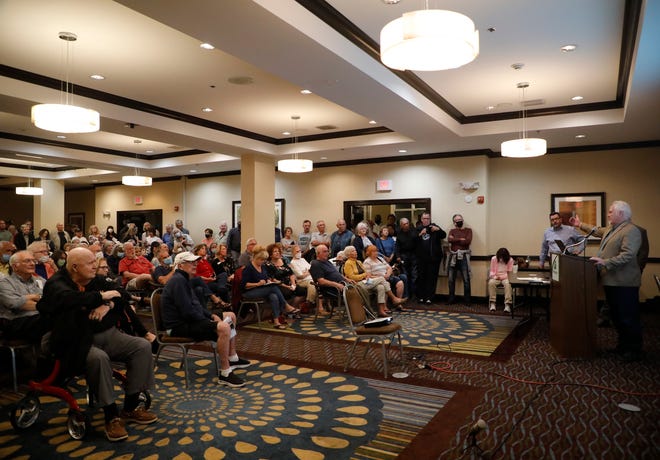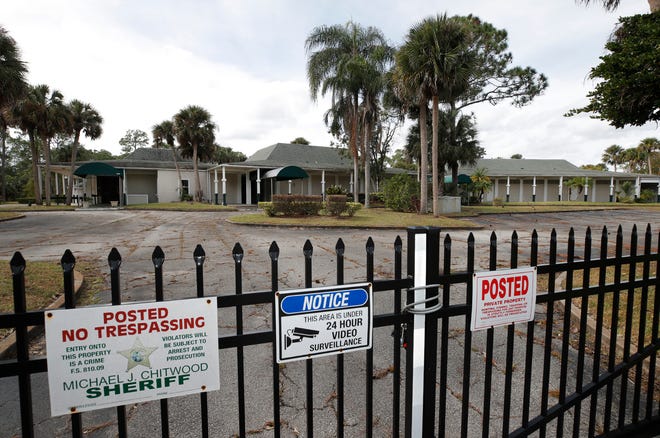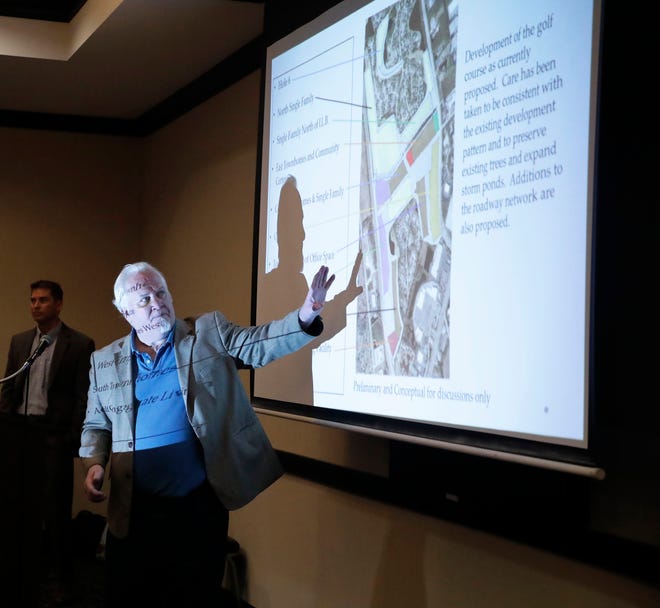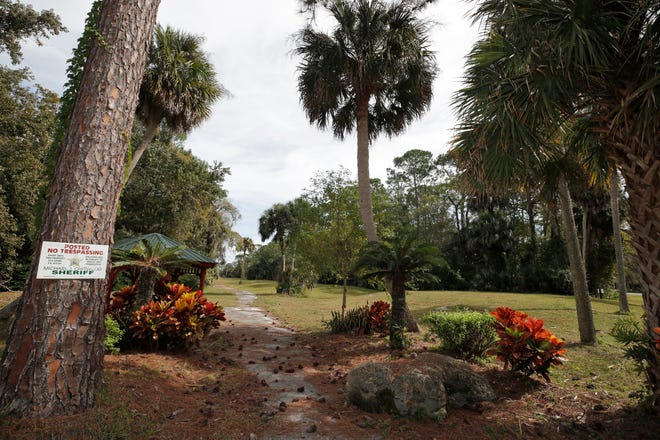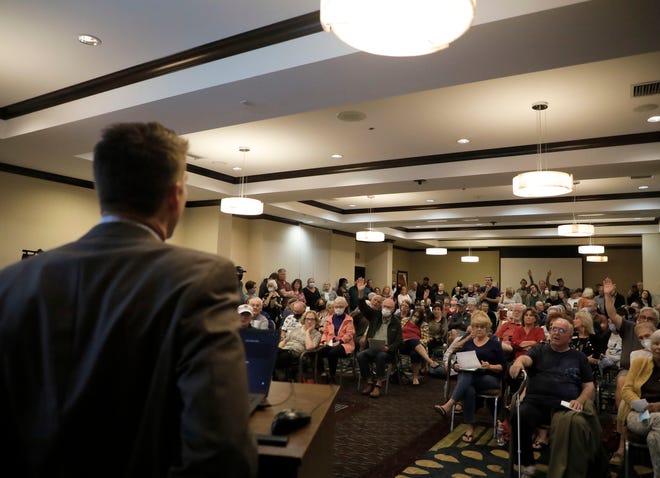|
Article Courtesy of The
Daytona Beach News-Journal
By Eileen Zaffiro-Kean
Published November 24, 2021
|
DAYTONA BEACH — About 300 people — mostly Indigo Lakes residents — jammed into a
meeting room designed for half that number Tuesday night.
|
Many of them made clear just how much
they detest a new proposal to build new single-family homes,
townhomes, offices, light industrial space and a senior
citizen living facility on the shuttered 250-acre golf
course in their neighborhood.
An Orlando attorney representing the owner of the idled
Indigo Lakes golf course at the meeting got no more than a
sentence or two out of his mouth as he tried to share the
history of the course when he was interrupted by a resident
of the Daytona Beach neighborhood.
"Why don't we skip that B.S., sir?" the man blurted out.
"You're eating into our hour for the meeting."
And so it went as attorney Chris Roper attempted to relay
who had owned the 45-year-old course in the past, how much
they paid and why the course closed in 2018. Every few
minutes someone would loudly interrupt with a criticism or
hostile question.
Orlando planning consultant Jim Hall was also heckled as he
walked the group through plans for the 18-hole course. But
Hall and Roper said they still plan to file their rezoning
application with the city in a month or two.
The two said they will try to incorporate
into their plans the comments and questions they heard
inside the Holiday Inn off of LPGA Boulevard. But they and
golf course owner Colin Jon aren't walking away from the
newly unveiled development proposal. |
|
About 300 people jammed into a
meeting room Tuesday night to discuss proposed plans for new
residential and commercial development in Daytona Beach's Indigo
Lakes neighborhood. Many people in the room didn't like what they
heard and will fight the changes being sought for what is now 250
acres of golf course land.
|
City commissioners will ultimately decide whether Jon's plan is approved,
but months worth of other steps have to be taken before that vote is cast.
|
Once city staff members review the
proposal, it will be sent to the Planning Board, and then
the City Commission for an initial hearing. Then state
officials and the Volusia Growth Management Commission will
review the proposed land use changes, and then the proposal
will go back to city commissioners.
Another neighborhood meeting will also be required early in
the process.
While all that happens, some residents of the 450-home
Indigo Lakes neighborhood will strategize ways to block the
plan. One man announced during the meeting that he has
already identified a half dozen legal grounds to sue Jon, a
Chinese-Canadian investor who is part of a group that bought
Indigo Lakes Golf Club in 2013.
Jon, who was not at Tuesday night's meeting, has tried to
develop the course a few times, but so far hasn't followed
through. Every attempt he's made so far has received strong
pushback from the neighborhood, and now the resistance is
ratcheting up again.
The Indigo golf course owner's plan
The Indigo Lakes golf course is one of a handful of courses
in Volusia County that have closed in recent years as golf's
popularity has waned.
The Indigo Lakes course was built in 1976, and homes started
to go up around the 18-hole course in the late 1970s.
The golf course sold for $5 million in
1994, and then sold again in 2006 for $3.6 million. In 2011
a bank acquired it through foreclosure, and two years later
Jon bought it for $1.25 million.
|
|
Residents of Daytona Beach's Indigo Lakes
neighborhood say they've watched the 18-hole golf course in their
community slide into increasingly worse condition over the past five
years or so. The 250-acre golf course is closed now, with the
clubhouse parking lot gated off and golf cart trails blocked by
large boulders. The course owner is hoping to build new homes and
businesses on at least some of the land.
|
From 2013-2016, membership at the golf course plummeted by 81%, said Roper,
who's with the Akerman law firm.
|
In 2018 and 2019, Jon
moved toward building homes and businesses on some of the
golf course. A land use change the city approved in 2007
allows up to 475 new homes to be built on the golf course,
but Jon wound up dropping his effort.
Indigo Lakes, which is just west of Williamson Boulevard
near International Speedway Boulevard, currently has 431
single-family homes and 70 condominiums, for a total of 501
housing units.
The new proposal calls for adding 252 single-family homes;
188 townhomes; a 120-bed assisted living facility; 130,000
square feet of business space including light industrial
uses; 100,000 square feet of office space; and 6,000 square
feet of commercial space.
The latest plan proposes using the full 250-acre golf course
and only leaving some green space to buffer current
homeowners and ponds that would be needed for storm water
drainage.
The proposal calls for filling the golf course land on the
north end of the neighborhood with single-family homes and a
clubhouse.
In the center of the neighborhood would be more
single-family homes, townhomes, a community center and a
small cluster of commercial, office and service space.
In the southeast corner of the neighborhood fronting
Williamson Boulevard there would be office space, and more
business space could be located just east of Interstate 95
in an area that's not directly adjacent to any existing
homes.
In the southwest corner of the neighborhood, there could be
more townhomes and an adult congregate living facility for
senior citizens on Indigo Drive. |
|
Jim Hall, a planning consultant with Orlando-based
Hall Development Services, explained to residents of Daytona Beach's
Indigo Lakes neighborhood what's being proposed for 250 acres in
their community that has always been used as a golf course. Plans
call for new residential and commercial development on the property.
|
A
new access road could be built just east of I-95 to access the warehouse and
office space there from International Speedway Boulevard. Indigo Lakes Boulevard
could be extended west to reach new homes and the access road along I-95.
|
The development plan,
which is still just conceptual, calls for keeping at least
some existing trees on the golf course.
The intention is to amend the city's comprehensive plan and
rezone the property to Planned Development – General.
The hope is to redevelop the property with a mixed-use
project that will complement both the adjacent residential
as well as the newer development occurring along the
Interstate 95 corridor.
Asked if any specific businesses are lined up yet, Roper
said "we're talking to prospective end users." He said it
would probably take at least a year before anyone would see
any new development work starting.
Venting worries
At Tuesday's meeting, people stood along the walls and
spilled out into a hallway. There was no functioning
microphone in the room, and people in the back had trouble
hearing.
"You don't show the residents of this community any
consideration when you only put 50 chairs out and they can't
hear in the back," one man said.
Throughout the hour-long meeting, the questions from
residents came one after another. No one shared their name.
They just started talking.
As soon as Hall mentioned the word townhome, someone shouted
"No! No! No to all of it!" |
|
For about 15 years, residents of Daytona Beach's
Indigo Lakes neighborhood have lived with the threat of homes and
businesses being built on the 18-hole golf course in their
community. The owner of the Indigo Lakes golf course is again
pursuing a rezoning for the 250-acre course that would allow a mix
of new residential and commercial construction.
|
"You're going to double the size of our community overnight," another person
said.
|
"This is going to be a
disaster for all who live here," a woman said.
"So that's not going to devalue our homes?" someone asked.
"The owner has every vested interest in
seeing property values increase," Roper said. "We're in this
together."
Others said they're worried about a spike in traffic or
insufficient water service. One woman said she sees nothing
that benefits current residents.
"We can't leave it as it is," Roper said of the closed golf
course. "We've got to work together."
One man asked if the golf course could be declared blighted
and the city could buy it.
"I think the changes they're asking for are unacceptable,"
he said.
Some residents challenged whether there was even a legal
right to build on the course. Roper said the founders of the
Indigo Lakes golf course were careful not to encumber the
property with restrictions for future development, which
drew a few jeers from people who disagree.
Hall reminded the group that the meeting was called to get a
conversation going with neighborhood residents and adjust
the plan if needed.
"We're going to continue on with the process and try to come
to some kind of compromise," Hall said.
"You're not listening to us," a man replied. "We don't want
you."
"So you're a 'hell no,' " Roper responded. |
|
At a meeting Tuesday night, Orlando attorney Chris
Roper, who represents the owner of the Indigo Lakes golf course
property, explained to residents in the Daytona Beach neighborhood
that surrounds the course property what the owner wants to do with
new residential and commercial development.
|
Fighting development at Indigo Lakes
The course has changed ownership five times in the last 35 years, and over the
past decade there have been at least three other attempts to cover some of the
course’s 250 acres with new homes and businesses.
But owners of the course have bumped into restrictions on the property, so
residents who largely don't want new development have been able to hang onto the
green space woven into the neighborhood.
The various homeowners’ associations in Indigo Lakes could cite covenants and
restrictions that could lead to lawsuits against the golf course owner. The
other potential roadblocks are the zoning and comprehensive plan changes that
would be needed for Jon's latest plan.
A comprehensive plan is a document that provides a long-range guide for when and
how growth occurs in a city. When changes are sought for a comprehensive plan,
they have to be sent to various state government agencies for their review and
OK.
About 80%–90% of the Indigo course land can only be used for a golf course under
the current zoning and comprehensive plan, said Dennis Mrozek, the city's
Planning Director. The balance of the 250 acres have three zoning designations
attached to them: single family residential, multi-family residential and
residential/professional uses.
There’s also a Scenic Thoroughfare Overlay District on the golf course property
that requires larger-than-usual setbacks for development.
The current zoning on about 10%–20% of the golf course would allow single-family
homes, duplexes, multi-family complexes, assisted-living facilities, hospice
facilities, childcare facilities, public and private schools, nursing homes,
places or worship and shelters for victims of domestic abuse.
Past efforts to develop Indigo course
Indigo golf course owners have come to the city before seeking permission to
build single and multi-family family homes as well as commercial development,
Mrozek said.
In 2007, under an owner who had bought the course the previous year for $3.6
million, there was an attempt to use 53 acres for residential development and to
modernize the golf course and clubhouse.
A measure city commissioners passed in July 2007 changed the future land use of
those 53 acres south of Indigo Drive and Crooked Stick Drive. Under the changes,
a little over 28 acres could still have as many as eight new residential units
per acre, and another 25 acres located along Williamson Boulevard and Indigo
Drive could have up to 10 residential units per acre.
There would be a 35-foot height limit for new buildings within 300 feet of
existing single-family homes, and a 48-foot height limit for structures farther
out.
In 2007, the golf course owners were looking at putting a multi-level condo on
the 10th hole, which is a short distance from Executive Tour and Travelsouth.
But the Great Recession hit around the time the new land use measure passed, and
nothing came of it.
In 2016, three years after Jon and his partners bought the 18-hole property for
$1.25 million, there was an attempt to shut down the whole golf course and
create something different. There would have been a plethora of new residential
development and a trail system.
But with talk of 400-600 new housing units, residents found the idea very
invasive and the proposal quietly died.
|
